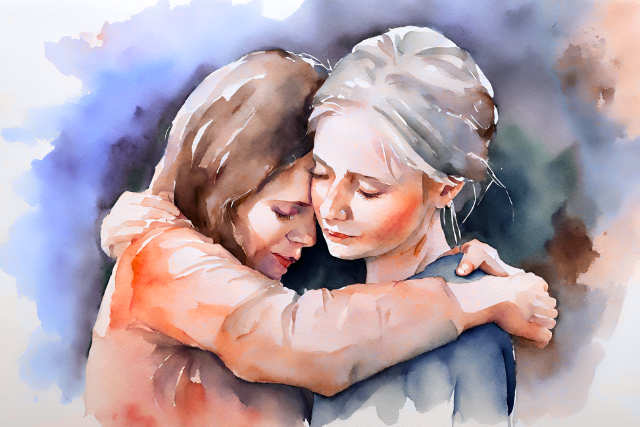
“Words have the power to both destroy and heal. When words are both true and kind, they can change our world.” ~Buddha
“I’m sorry for your loss” is a perfectly acceptable response…if I’ve told you I’ve lost my phone. In that instance, I can appreciate the sentiment, empathy, and authenticity of the phrase. It’s my loss and my loss alone. I know you can put yourself in my shoes and internalize what it would feel like to be without this critical device and, as such, the words carry weight.
When I tell you my parents are dead, though? Maybe not so much. That’s because they’re monumental deaths that are not easily relatable for most. See, my dad passed away from ALS when I was fourteen. My mom then accelerated her unhealthy relationship with food and passed away due to complications from morbid obesity when I was twenty-seven. I’m an only child.
Approach me with this filler phrase when this has been revealed, and my knee-jerk reaction will be a rushed “uh huh, thanks. Anyway…” I don’t mean to be brusque (well, I guess I do). I know you’re doing your best. You know you have to say something in response to this info. and, chances are, everything you think of in those few milliseconds after this revelation seems to fall short.
So the autopilot, reflexive, out-of-office reply surfaces to the top.
Here’s why it’s problematic.
Only ‘My Loss,’ Really?
Not to play a game of semantics, but the first issue I take with this filler phrase is that it conveys these deaths are only my loss. Yes, I know you’re speaking directly to me and not my parents’ siblings, friends, co-workers, or grandchildren. But these—either individually or collectively—are not singular losses.
My grandmother lost the ability to outlive her children.
My dad’s friends lost their weekly poker buddy.
My mom’s co-workers lost the office’s “voice of reason.”
My daughter lost the privilege to ever know her grandparents.
The world lost whatever future contributions these two would have made to it.
My point is, there are many people who lost something on those two separate days—and those losses have continued along with their absence.
Alienation, Party of One
Placing this loss directly on me—or on anyone, for that matter—also creates a separation between us. Yes, it might have been a loss in my life, not in yours, but you’ve now squarely bifurcated us.
I am the bereaved; you are the condoler.
The last thing someone mentioning a death needs (IMO) is to be constantly reminded that we’re different from the rest of you. That the black cloud is over our heads, not yours.
Grief and loss and death, not to mention the sadness and depression that can go along with them, is isolating enough. Please don’t magnify that even more by placing us on opposite sides of the fence.
Comfort, Camaraderie
The biggest problem I have with the loss apology is that it really doesn’t offer anything. No source of comfort. No relatability. No words of advice that you can turn to when you’re struggling.
It’s a “break glass in case of emergency” phrase for those who don’t know what to say. For me, it’s words I bob and weave to get away from like a dodgeball torpedoed at my head.
I don’t mean to sound ungrateful, I really don’t. I know you’re doing the best you can. I simply hope to provide a little cause for pause if this is your go-to condolence.
Plus, consider yourself lucky. If hearing about these sorts of losses and deaths makes you uncomfortable to the point that your brain turns to mush, it might be because you haven’t experienced this kind of grief yourself. That’s something to be happy about. And trust me when I say, I’m happy for you. I really am!
Okay, now that we know why this phrase can rub the aggrieved the wrong way, what can we say instead?
Rephrase the Loss Apology
Tweak your sentiments slightly, and suddenly you’ve got a phrase that feels authentic and relatable, at least to me.
I’m perfectly happy with:
“I’m sorry you had to…
- go through that.
- experience that.
- deal with such early losses.
- encounter these tragedies so early on.
- figure out how to navigate life on your own without your parents.
You get the point. Any iteration of this phrase works for me for two reasons. First, because it acknowledges my personal experience, versus framing the deaths as my loss and my loss alone. Second, because, although you may not be able to relate, a sense of empathy and authenticity comes through by recognizing that these palpable losses had palpable effects.
Share a Memory
The absolute best condolence I ever received came from a young man I had never met. We were at my mom’s funeral when he came up to introduce himself. He was the son of one of her co-workers, though her name wasn’t familiar. His presence was a little quizzical to me, as his eyes were red, his nose was runny, yet I had no idea who he was.
He told me he’d gotten to talking to her when he’d visit his mom in the office. Apparently, they developed a rapport over time. So much so that she was the first person he decided to come out to. He told me how she received this news with love, support, and a welcomed ambivalence that let him know it was okay to be himself. That nothing was different with this added piece of information.
I have tears in my eyes as I write this. To this day, that short encounter has been the best gift any single human has ever given me regarding my mom. It brought comfort. It let me know she touched others (and kept treasured things to herself). It showed the magnitude of her loss outside of myself.
When you lose a parent to (food) addiction the way I did, it’s very easy to vilify them. They should’ve known better. Done better. Been better.
Then I think of that story and, at least in that instance, she’s a goddamn hero in my eyes. And not for how she received the news—though she seemed to handle that well—but for being such a source of support and comfort to this young man that he chose her, of all people, to come out to.
Wow. I can’t say I’ve ever left an impact like that on someone. That is admirable, and the encounter is something I’ll treasure always.
I do want to add a slight caveat to sharing stories about the deceased, though. It’s all about right place, right time. Had I been going into a meeting, about to speak to a crowd, or been ready to engage in anything that involved my full attention and right mind, this would not have been the time to share something that might have made me crumble.
This strategy requires you to read the room a little, but it can be the best condolence you can bestow if the timing is right.
The Leading Statement
As the above example shows, your statement doesn’t even need to involve an apology. After all, you didn’t kill them, right? If you did, totally apologize. Hopefully from behind bars.
Anyway, I love the leading statement strategy because it gives the aggrieved options.
“That must have been so hard for you.”
“I’m sure that was a difficult thing to experience so young.”
These open-ended statements give us choices. We can simply acknowledge them, usher an appreciative thank you, and steer the conversation in another direction if we don’t feel like deep diving into grief.
Or we can use them as a jumping off point and say, “It was really hard, I think the most difficult thing was…” Now we’re in a conversation. An exchange. Two people on the same side discussing an experience. It’s not me on one side receiving an apology about a “singular” loss and you on the other, nervously scratching at your neck and wincing, wondering what happens next.
And, in case you’re wondering, yes, I am absolutely guilty of wielding this phrase myself. I’ve never appreciated hearing it or saying it, but I’ve really started to internalize how hollow these words are recently, since discussing my parents’ deaths more publicly.
So let’s all strive to do better. I know we can. If we shift our thinking more toward what may benefit the aggrieved—versus allowing the first obligatory phrase we can think of to pop out of our mouths—these encounters will be a lot less uncomfortable.
And, if all else fails, show us a picture of your dog. They always bring comfort, relatability, and connection. Hey, they don’t call them emotional support animals for nothing…
About Courtney Deane
Courtney Deane is a freelance writer and editor for print, online and broadcast outlets, as well as PR and marketing clients. She worked to turn the deaths of her parents into something positive—her debut novel, When Happily Ever After Fails. Deane lives in San Diego with her husband, daughter, and rescue dog—her very own happily-ever-after. Order the book. Visit the website. Get the newsletter. Follow on socials: Instagram: @AuthorCourtneyDeaneFacebook: Courtney Deane TikTok: @CourtneyDeane YouTube: @CourtneyDeane













 Though I run this site, it is not mine. It's ours. It's not about me. It's about us. Your stories and your wisdom are just as meaningful as mine.
Though I run this site, it is not mine. It's ours. It's not about me. It's about us. Your stories and your wisdom are just as meaningful as mine.
An alternative view: I’m usually happy with that phrase, grateful someone is acknowledging the difficulty of me going through grief.
Thank you for this! Very needed. I’ve never liked this phrase. I usually stop at “I’m sorry. ” or “I’m so sorry.” Do you find that that’s enough or should there be more detail?